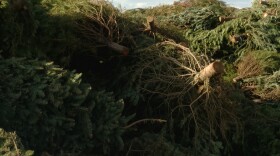DEBORAH AMOS, host:
This is MORNING EDITION from NPR News. I'm Deborah Amos.
RENEE MONTAGNE, host:
And I'm Renee Montagne. The Turkish city of Istanbul is experiencing violence not seen in years.
(Soundbite of yelling)
MONTAGNE: In a crowded neighborhood, two bombs exploded yesterday. First a small blast attracted a crowd. Then a much larger bomb exploded a few minutes later. Seventeen people are dead, 150 more are wounded. And we go now to NPR's Ivan Watson in Istanbul to find out more.
And Ivan, what details do you have about this bombing?
IVAN WATSON: This was definitely the deadliest attack, bomb attack, in Istanbul in five years, Renee. And as you said, the first bomb went off - it was a small bomb on a crowded pedestrian street full of shops and cafes in a middle class neighborhood. And then ten minutes later, after a crowd had gathered to investigate, that's when the second, much larger explosion went off. Turkish TV aired traumatizing images of bloody women and children and men being put into ambulances.
The governor of Istanbul says this was a deliberate attack against civilians at one of the most crowded times of day. And he says the bombs consisted of plastic explosives hidden in garbage cans.
MONTAGNE: And who's being blamed for these bombings?
WATSON: Well, the Turkish press has been pretty quick to blame this on Kurdish separatists known as the PKK. In fact, a newspaper headline this morning read, quote, PKK civilian massacre. Government officials haven't made any formal accusations yet. They say they're reviewing videotapes from security cameras in the area as part of the investigation.
Meanwhile, there's been no claim or denial of responsibility so far from the PKK. One reason why the Kurdish rebels are being blamed is that there's been an increase in deadly clashes with the Kurdish rebels in recent weeks in southeastern Turkey. And Turkish war planes bombed suspected PKK targets in northern Iraq twice last week.
I also have to point out, Renee, that it's not uncommon to see mysterious bombings in Turkey, and they're typically blamed on groups that range across the political spectrum, from anarchists to Kurdish separatists to al-Qaida-inspired groups, and even ultranationalists with links to the Turkish security forces. So it really - all of these groups could be suspects behind this attack.
MONTAGNE: Although this one, pretty terrible, as you said. How are people there reacting to it?
WATSON: Well, near the scene of the attack people have been hanging hundreds of Turkish flags outside their apartment windows. Meanwhile, the Turkish government, it cancelled a cabinet meeting. The prime minister has made an appeal for national unity in response to what he is calling an act of savagery.
MONTAGNE: And Ivan, this attack comes at what is already a pretty tense time politically in Turkey. Is it going to have an impact on a court case that's underway in Ankara which would ban the ruling political party from government?
WATSON: It's definitely going to raise confusion and anxiety among many Turks at a time when the country is polarized. This morning, judges from the constitutional court have begun what should be the final rounds of hearings to decide whether or not to ban this government.
The ruling justice and development party has been accused of trying to undermine the secular system of government in Turkey. And the prosecutor is calling for the prime minister and the president to be banned from politics for the next five years. We could have an answer in a matter of hours or in several days.
And at the same time there have been scores of secularists who have been arrested and accused of being part of a coup plot to overthrow the current government. So this is coming, again, at a very tense time for Turkish society. People are under a lot of pressure right now. And again, we'll see a lot more anxiety in the streets now.
MONTAGNE: Well, just what could happen should the ruling party be banned?
WATSON: Nobody really knows. And especially if the president and the prime minister are banned from politics, it's entering uncharted waters for this country.
MONTAGNE: Certainly. Thank you very much, Ivan.
WATSON: You're welcome, Renee.
MONTAGNE: NPR's Ivan Watson speaking to us from Istanbul, where a double bombing has left at least 17 people dead. Transcript provided by NPR, Copyright NPR.







